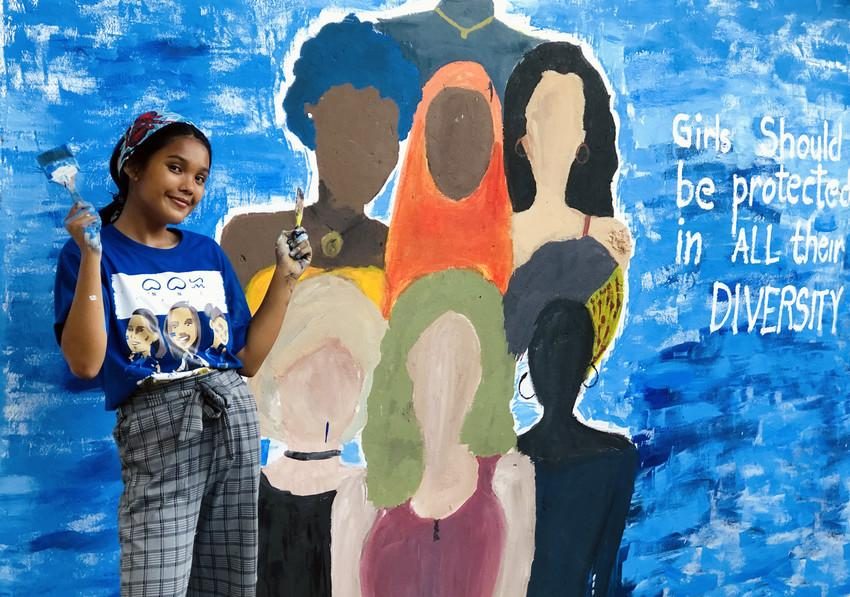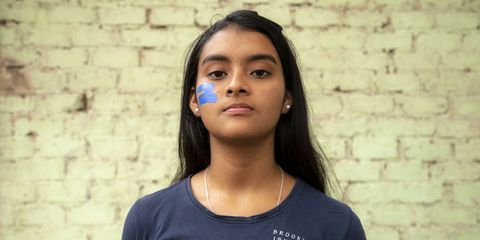14 NOVEMBER 2019
Catcalling is not a compliment. It’s not harmless and girls shouldn’t accept it as normal. Here are some of the creative ways girls across the globe are finding to tackle street harassment.

1. Chalk Backs
Chalk Back is a girl and youth-led, grassroots movement that uses public chalk art to raise awareness about gender-based street harassment.
The movement started in New York City in March 2016, when university student Sophie Sandberg set up the Instagram account @CatcallsofNYC to share her own, and other girls’ experiences of street harassment.
The account has since inspired 150 young activists around the world to start their own accounts. The groups are collectively known as Chalk Back.
Stories of harassment and their locations are gathered through direct messages on Instagram, then chalked word-for-word with the hashtag #StopStreetHarassment – at the same location the abuse occurred.
Images of the chalked catcalls are then posted on social media for all to see.
The goal is to spur dialogue, create an atmosphere of solidarity and promote cultural change.
Chalking back takes the burden of harassment off the harassed and makes it the public’s shared problem to solve.
“Chalk back encourages young activists to come together and raise their voices. As girls, young women and LGBTIQ+ youth, we have put up with sexual harassment for too long.”
– Sophie Sandberg, Founder Of @Catcallsofnyc
2. Dear Catcallers
Noa from the Netherlands decided to ask catcallers to take selfies with her.
“They’re not at all suspicious because they find what they do completely normal,” she says.
On the @DeatCatcallers Instagram she recorded a month’s worth of catcalling experiences – 21 incidents in total – along with quotes of what the perpetrators said, or her feelings about what she heard.
Now, Noa hopes to take the message worldwide by encouraging others to join in.
“My month of posts has ended, but it doesn’t mean that catcallers are in the past as well.
“Thanks for all the support and messages. It has made it clear that catcalling is still a common occurrence that many of us are dealing with.”
3. Our Streets Now
Sisters Gemma, 14, and Maya, 20, from the UK are leading a campaign* to make street harassment illegal.
Gemma was only 11 when she started getting harassed in the street by adult men – and things haven’t improved since. When walking home from school not long ago, men sitting at a cafe beckoned her over with lewd comments.
“I actually turned around and said ‘I’m 13. I’m in my school uniform – don’t do that’.”
“One of them said to me: ‘Age doesn’t matter to me’. I found that shocking.”
This summer the girls started their petition to make street harassment a crime by UK law. They are currently working with Plan UK on the ‘Crime not Compliment‘ campaign.
“Girls can be heroes. We can change and save the world. We are strong and powerful. We do not need prince charming to save us.”
– Young Activist, Philippines
4. Safer cities through street art

In Masbate, Philippines, young artists took over one of the city’s unsafe alleyways and transformed it into an inclusive space through the use of street art.
The girls aged between 13-18, part of the Safer Cities for Girls project, created their art on the theme of ‘being a girl champion.’
“Girls can be heroes. We can change and save the world. We are strong and powerful. We do not need prince charming to save us,” said one of the girls involved.
Safer Cities for Girls projects are currently running in 12 locations across the globe, giving girls a platform to discuss the issues they face and opportunities to provide input into the development of their cities.
5. Chalk Back x Girls Get Equal
For 16 Days of Activism Against Gender-Based Violence* in 2019, Plan International’s youth-led campaign, Girls Get Equal teamed with Chalk Back to host awareness-raising events in Kampala, Nairobi and Delhi.
The events were hosted by Plan International’s Safer Cities for Girls groups and used chalk art to encourage conversation around the issues of harassment and involve the public in finding solutions.
“Chalk Back encourages young activists to come together and raise their voices. As girls, young women and LGBTIQ+ youth, we have put up with sexual harassment for too long.
“Partnering with Girls Get Equal will allow us to reach new young activists around the world, hugely amplifying the efforts of our grassroots activism,” says Sophie Sandberg, founder of the Chalk Back movement.
Support girls who are speaking out against harassment by sharing their stories and using the hashtag #StopStreetHarassment.
* Plan International is not responsible for the content of other sites.
Categories: Campaigns, Protection from violence
